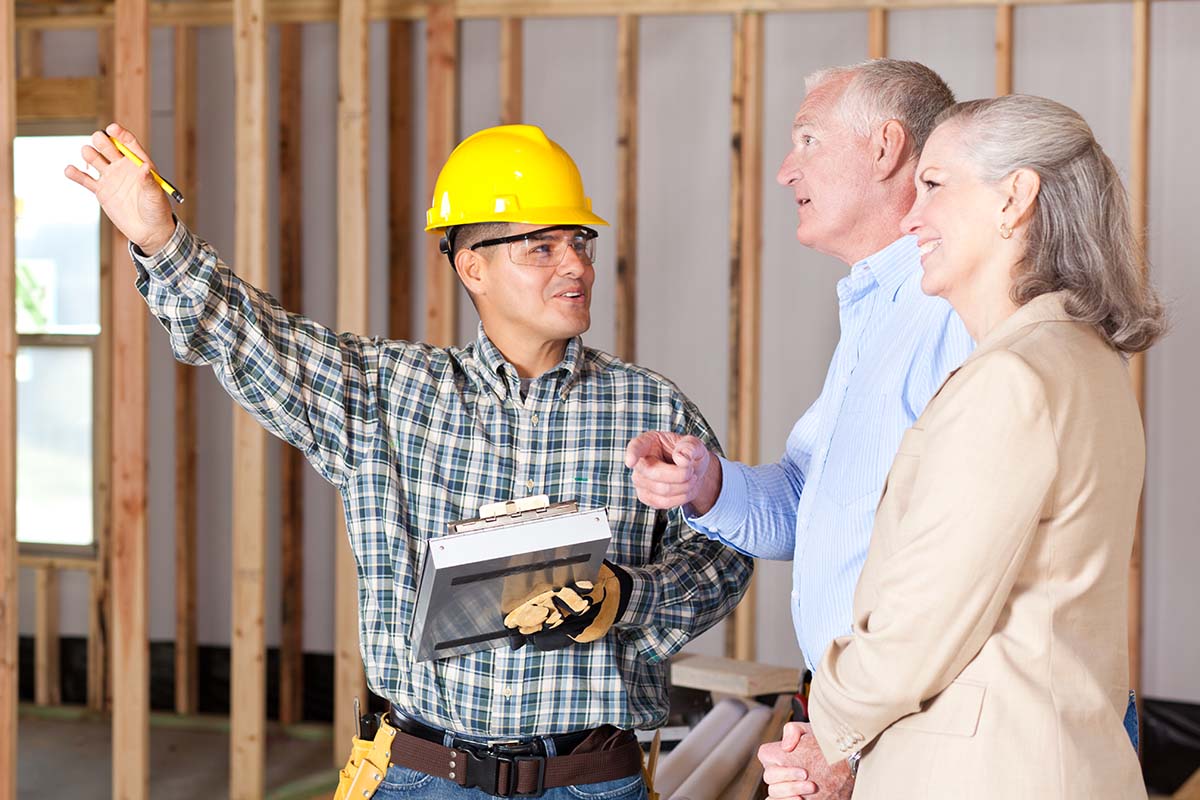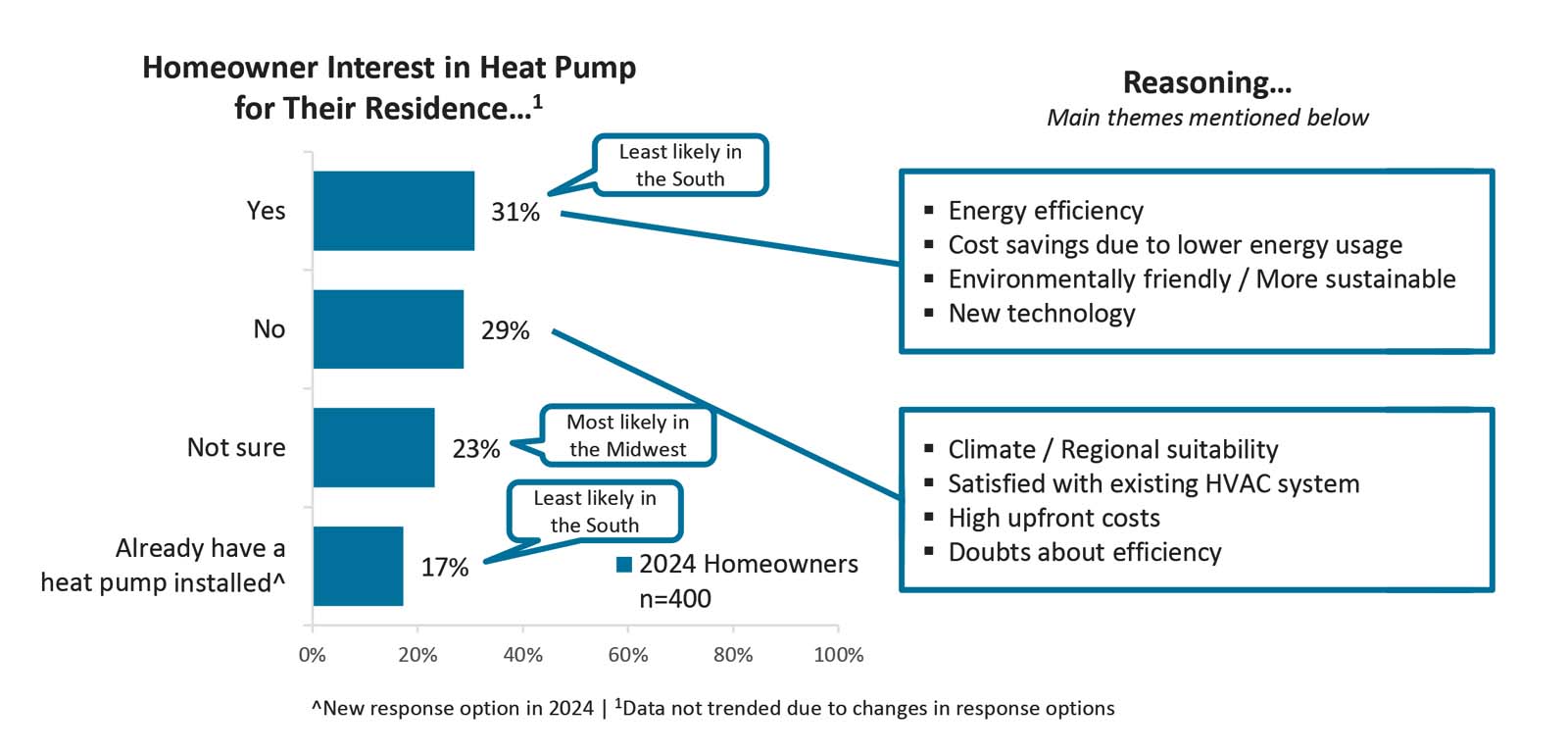Nearly all contractors are getting questions from homeowners about heat pumps, which now, on average, account for 33% of installation jobs last year. But there’s still a sizeable chunk of homeowners who say they’ve heard of heat pumps, but don’t have any knowledge or familiarity of what they actually do.
That’s according to a new 2024 survey of 400 homeowners and 120 contractors conducted by myCLEARopinion, a business research firm and part of BNP Media Inc., the parent company of The ACHR NEWS.

Click graph to enlarge
HOUSEHOLD NAME: A new study shows that the majority of homeowners are familiar with heat pumps. (Courtesy of myCLEARopinion Insights Hub)
This new data set also shows that some homeowners who are hesitant to pull the trigger on a heat pump are citing concerns about performance in the climate they're in, or are concerned about the upfront price, even though there is a plethora of programs out there to help offset costs.
Despite these hesitations, the data is also showing heat pump installations riding a healthy upward trend, and contractors themselves believe this is only going to continue.
Becoming a Household Name
It’s safe to say heat pumps are no longer a niche item — according to the survey, 27% of homeowners considered themselves “extremely knowledgeable/familiar” with the technology, while 25% said they had some knowledge, and 6% said they’ve never heard of it.
But there was also a significant population, 24%, who said they’ve heard of heat pumps but know nothing about them, making that a huge, untapped market.

COMMUNICATING THE BENEFITS: Most homeowners are aware of heat pumps and their benefits, but there is a sizable chunk who don’t have any knowledge on the subject. (Courtesy of Getty Images / SDI Productions)
Panama Bartholomy, Building Decarbonization Coalition (BDC) founder and executive director, said it’s up to the industry to demystify heat pumps if they want to capitalize.
But, on the other side of the coin, Bartholomy said the customer doesn’t need to be bombarded with information — this is, after all, HVAC, and the customer really only cares about the end result and the bill.
Looking for a reprint of this article?
From high-res PDFs to custom plaques, order your copy today!
“Ultimately, customers don't really care about this so much — they just want to know that their HVAC system is going to keep them comfortable and safe and be affordable,” Bartholomy said.
Bartholomy actually suggests not to draw so many distinctions between heat pumps and more traditional options, because that’s just going to lead to confusion and doubt.
“You're only having this touch point with them once every, you know, 15 years as you're replacing the system,” Bartholomy said. “And it's not something (homeowners) want to talk about. It's not something they want to become experts in. They just want their system back. So really, instead of saying, ‘Oh, I have this totally different thing for you to consider versus what you already have, and let me talk to you about that,’ instead say, ‘Yes, I want to get you the product that's going to make you the happiest.’”
For those surveyed who said they were interested (31%) in a heat pump for their home, the reasoning was energy efficiency, cost savings due to lower energy usage, environmental and sustainability aspects, and it simply being a new technology.

Click graph to enlarge
ALL THE RIGHT REASONS: For those surveyed who said they were interested (31%) in a heat pump for their home, the reasoning was energy efficiency, cost savings due to lower energy usage, environmental and sustainability aspects, and it simply being a new technology. (Courtesy of myCLEARopinion Insights Hub)
And right now, that’s the heat pump, and it’s going to provide the customer with everything they want, which should make it an easy decision, especially because it can be two to four times more efficient. But, again, Bartholomy said just to focus on the benefits instead of the distinctions.
David Rames, senior product manager at Midea, said a similar Midea study showed 80% at least knew what a heat pump was, which falls to about 4% when asked about the specifics — capacity, power, efficiency, etc.
“(Homeowners) know of heat pumps, but they’re still very confused, or lack knowledge, of the performance of today’s heat pumps,” Rames said. “So that’s where we have to continue to push that message.”
Rames said that message should be simple — this isn’t Grandpa’s heat pump anymore.
“Grandpa was always cussing and kicking and spitting about that heat pump at 40°F — the thing started to lose its luster and everybody was cold, and then the auxiliary heat strips come in and the utility bill goes out the roof,” Rames said. “Those days are long gone — so everyone needs to have the confidence of the heat output of today’s heat pumps.”
Over at METUS, Patty Gillette, senior director of marketing, said they’ve also conducted a survey of homeowners, which shows that consumers’ knowledge and adoption of heat pumps have increased significantly since 2023. As a company, METUS is trying to capture this momentum by working to educate homeowners and contractors about the benefits of all-electric heat pump systems, including their energy efficiency and sustainability — not to mention incentives offered at the federal and state levels.
“Contractors have clout when it comes to heat pump investments for homeowners,” Gillette said. “Eighty-two percent of the homeowners with heat pumps we surveyed found their HVAC contractor somewhat or very influential when investing in one. That’s why we are creating things like marketing toolkits and accelerated training programs to equip contractors with as much heat pump knowledge as possible.”
Misconceptions, or What’s in a Name
One frequent point of confusion for homeowners is that these units are called “heat pumps,” even though they make for excellent a/c units.
Rames said they’ve run into this situation, where a homeowner is all onboard for a heat pump install, but then asks, “Well, what are we going to do for cooling?”
To push that message, Rames said Midea is starting from the manufacturing side of thing, putting together a top-notch technician service team that travels all over North America to do training.
At first, Midea was taking this info right to the distributors, but then decided to take it a step forward and invite the contractors as well. That eliminated the game of telephone, and got the message right from the manufacturer to the boots walking through a homeowner’s door.
“They can hear it directly from the horse's mouth from the manufacturer, who has spent hours and hours and hours putting these products together,” Rames said.
While there is a focus on homeowner awareness, there still are some gaps when it comes to contractor knowledge and skepticism. Rames said they’re still seeing contractors being apprehensive, and some even still thinking heat pumps are only for southern climates.
For those who said they didn’t want a heat pump in their home, the reasoning was climate suitability, high upfront costs, doubts about efficiency, or they were satisfied with their existing system.
Rames said he understands that — it’s not going to be his phone ringing at 2 a.m. on a Saturday in February if something isn’t performing, but contractors and homeowners should still be confident in this technology.
“So I understand it, but the statistics are there, and we've got lab tests that show the heating capacity on this product — so don't be afraid to do it,” Rames said. “And in my house, I did it as well — I put in a 4-ton Midea extreme heat. I've got dual fuel in my house, but I've locked my compressor or my dual fuel furnace out until 5°F. And this past winter, it was fairly cold — I'm in Louisville, Kentucky, so it's not that bad, but my furnace maybe ran 2% of the time. That was it. And so, and those were temperatures we had a full week that was, you know, zero degrees, and so it can do it. We just have to just have confidence in the product.”
Gillette said education on modern-day capabilities is key, and busting these myths of poor cold-climate performance can only be squashed by passing knowledge to the consumer.
“That misconception is incorrect as today’s heat pumps can operate effectively well into negative temperatures. Our newest systems will deliver 100% heating capacity even in outdoor temperatures as low as -5°F with guaranteed heating down to -22°F.”
The best case in point? Maine — where heat pumps have been exploding in popularity as they phase out oil burners and other fossil fuel systems.
“Ninety percent of the (Maine) homeowners with heat pumps we surveyed would recommend them, with 41% touting the superior heating capabilities of these systems,” Gillette said.
Rames said even just a few years ago, the first question was always “What’s your heating capacity at -5°?”
“And then everybody got to 100% at 5°F, but we've got a lot of areas where 5°F is just not going to cut the mustard anymore,” Rames said. “Then we came out with a product and we were 100% at -4°F.”
That then progressed to -13°F, and the next plateau was reached during the cold climate heat pump technology challenge through the Department of Energy, where Midea hit 118% of heating capacity at -15°F.
“So that's the message we have to continue to get out — it's okay to pull out a gas furnace and to run strictly on an extreme heat or a high heat capacity heat pump. We can do that,” Rames said.
The Transition Phase
When it comes to quashing misconceptions, Bartholomy said there are two main things contractors have to consider: In this moment right now, this mid-transition phase where fossil fuels and electric options are basically standing on equal footing, the two methods co-exist, but that might not be forever.
“So there's some unique things that are going to be happening now that won't be happening in like 10 years,” Bartholomy said. “What I would put in that category would be hybrid heat pumps — there may be a situation right now where, in order to provide comfort to not only the customer but also the contractor, if there's still an operating fossil fuel heating system, you perhaps leave that in as you're replacing the air conditioner with the heat pump.”
With the heat pump taking 70-90% of the heating load, that will prove to the customer that it’s a viable option for cold weather, but they can also retain the fossil fuel heating system. This “bridge technology” theory for the customer, who may have doubts, wouldn’t work as well if the heating system was the equipment that needs to be replaced, but that will change once customers understand the benefits and capabilities of the next generation of cold climate heat pumps.
“I think it's imperative upon the manufacturing community and those government agencies that want to push heat pumps, to be working with contractors to be able to give them tools to be able to communicate with customers about, yes, you do have cold climate heat pumps that can operate in full heat pump mode all the way down to -14°before that backup resistance kicks in,” Bartholomy said. “I think it's an opportunity to talk about innovation. … It's really, really important for OEMs to be providing, easy, one-page, glossy material the contractors can use to do that education.”











